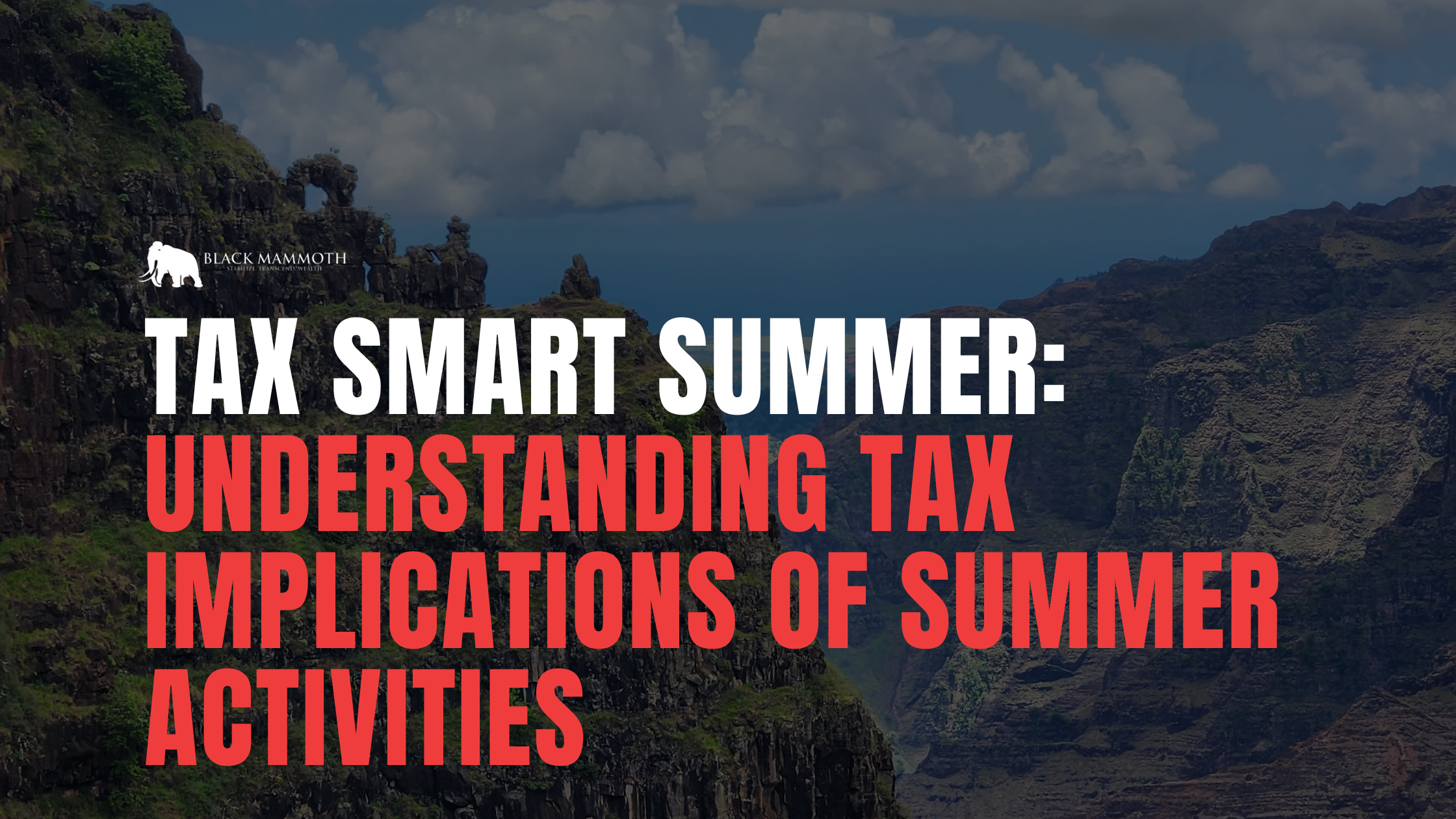Tax Smart Summer: Understanding Tax Implications of Summer Activities
You're enjoying sunshine, long weekends, maybe extra income from side hustles—but tax season is lurking. Whether you rent your spare bedroom, freelance as a dog-walker, or sell handmade goods at the local market, every summer activity brings tax implications. Stay ahead of the curve by understanding how the IRS views your side gig.
1. Renting Out Property: More Than Just Extra Income
a. When Summer Rental Income Must Be Reported
If you rent your home for more than 14 days in the year, that income is taxable investopedia.com+3irs.gov+3blockadvisors.com+3.
Use Schedule E on Form 1040 to report.
You can deduct mortgage interest, property tax, utilities, repairs—even depreciation irs.gov+2irs.gov+2turbotax.intuit.com+2irs.gov+1investopedia.com+1.
If you rent for 14 days or fewer (the “Augusta Rule”), you don’t report the rental income—but you can’t deduct related expenses either .
b. Active vs. Passive: The IRS Distinction
Renting is usually passive income—but if you provide significant services (like hotel-like amenities) or exceed the IRS thresholds, it becomes active business income, triggering self-employment taxes anderscpa.com.
You’ll report this on Schedule C, not Schedule E—and you’ll owe Social Security and Medicare taxes.
c. Local Taxes & Regulations
Short-term rentals often trigger occupancy and sales taxes—and city regulations turbotax.intuit.comairdna.co.
Action: Research city or county tourism/occupancy rules before listing.
2. Gig Economy & Freelancing: Income Without a Boss
a. All Income Counts
Whether you mow lawns, tutor kids, or drive for rideshare apps—all earnings count, even if under $600 or paid in cash .
Watch out for Form 1099-K, now issued when payment volume exceeds $5,000 in 2024—and REST thresholds drop in 2025 and 2026 financialsolutionadvisors.com+2wsj.com+2irs.gov+2.
b. Self‑Employment Taxes Apply
Earnings over $400 mean you're self-employed. That triggers Schedule C filing and a 15.3% self-employment tax (to cover Social Security + Medicare) .
You can deduct half of this on your Form 1040.
c. Deductible Business Expenses
Track and deduct expenses:
Vehicle mileage (use standard rate)
Home office & supplies
Fees for booking apps or marketing
Tools, internet usage, meals related to business wsj.com
3. Selling Handmade Goods: Hobby or Business?
a. You Must Report Income
All income—whether profit or loss—must be reported on your tax return wsj.com+1irs.gov+1. Even selling $50 of jewelry at a craft fair counts!
b. Business VS Hobby Determination
The IRS considers your intent and regularity: Are you trying to make a profit? Do you treat it like a business?
Schedule C if profit-driven and structured
Schedule 1, Form 1040 if hobby income irs.gov+1irs.gov+1
Hobby income avoids self-employment tax—but gives up deductions for supplies costs.
c. Self-Employment Threshold
If profits exceed $400 annually, Schedule C applies—and you're responsible for self-employment tax kiplinger.com.
4. Overlapping Income: Rental + Gig + Crafts
Example: You rent a cabin, freelance, and sell crafts—mixing Schedule E (rental) and Schedule C (business).
Report each income stream separately.
Passive rental still uses Schedule E; active services trigger Schedule C including self-employment tax.
Track mileage and home office rules carefully when deducting time split across activities.
5. Hobby-Loss Rules: Don’t Overspend in the Wrong Category
If you treat a hobby like a business but don’t turn a profit, IRC Sec. 183 limits your deductions to the income earned en.wikipedia.org.
Action: Keep evidence of profit intent—marketing efforts, sales history, pricing strategy.
6. Quarterly Estimates & Avoiding Penalties
The IRS requires quarterly estimated tax payments if you owe over $1,000 in net tax (Standard dates: April‑15, June‑16, Sept‑15, Jan‑15) wsj.com.
Missing these triggers penalties and interest.
Tip: Use tax software or advisor, track income/expenses, and pay regularly.
7. Retirement Benefits & Credits
As a self-employed person, consider:
SEP-IRA or Solo 401(k): Higher contribution limits & tax benefits wsj.com+1irs.gov+1.
Home office deduction, up to simplified standard of $5/square foot.
Self-employed health insurance deduction on Form 1040.
Also, check for pass-through deductions (often 20%)—note these may sunset after 2025 .
8. Record-Keeping Essentials
The IRS recommends organized records to support:
Income: Apps, bank statements, 1099s
Expenses: Invoices, mileage logs, receipts
Rentals: Booking records, service agreements
Get in the habit now—when it counts against fraud notices or disallowances.
Actionable Next Steps
Track All Summer Income—record daily.
Group Expenses Clearly—rental vs gig vs craft.
Classify Activities—Schedule E for rental without services; Schedule C if services apply.
Snap Those Receipts—scan every cost; log mileage monthly.
Pay Quarterly Taxes—use the IRS calculator or tax advisor.
Plan Retirement Deductions—set one up now to reduce annual taxes.
Resources
IRS Gig Economy Tax Center: Guidance for 1099‑earners and quarterly tax obligations wsj.com
TurboTax “Handmade Items” Guide: Outlines when self‑employment applies, Schedule C vs hobby income turbotax.intuit.com
Ready to Get Real About Your Money?
Stop guessing and Googling. The Black Mammoth Power Hour is your no-BS deep dive into what’s really going on with your finances. One hour. One-on-one. All eyes on your specific money situation—no fluff, no upsell, no generic advice.
Whether you’re trying to figure out what to do with that side hustle income, considering a Roth conversion, or wondering if your business is even profitable—this is where we cut through the noise.
You bring your questions. We bring clarity.
Book your Black Mammoth Power Hour now—because hoping things work out is not a wealth strategy.
You’re not just soaking up sun—you’re creating opportunity and income. Own it—but own your tax obligations too. Proper planning and documentation make the difference between a refund and penalties. Stay organized, know your forms, and face tax season confident. Summer success deserves that clarity.

